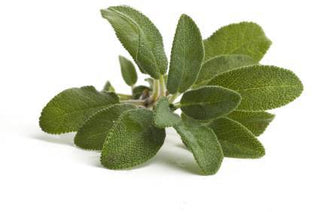(Salvia officinalis)
The Latin name for sage is salvia which means to heal so given to sage because of its medicinal properties. Sage has been used for centuries as a medicinal due to its antiseptic, astringent, and irritant properties. Often tea made from sage is used to treat sore throats and mouth irritations.
Health Benefits
Sage contains a number of flavonoids (including apigenin, diosmetin, and luteolin) and phenolic acids, including the phenolic acid named after rosemary - rosmarinic acid. Rosmarinic acid acts as an anti-inflammatory and antioxidant. The leaves and stems of the sage plant also contain antioxidant enzymes, including SOD (superoxide dismutase) and peroxidase. Compounds in sage have numerous brain health benefits including memory enhancement and inhibiting an enzyme that is associated with Alzheimer’s disease.
Nutritional Value
Ground sage is an excellent source of vitamin K, providing 34.3 mcg or 43% of daily values per tablespoon. It is also a good source of vitamin B6, calcium, iron and manganese.
Recipe Ideas
Sage has a subtle, sweet flavor that livens up soups, stews, casseroles, stuffing and meat dishes. Sage is often used as a marinade for a variety of meats.
Interesting Facts
The ability of sage to protect oils from oxidation has also led some companies to experiment with sage as a natural antioxidant additive to cooking oils that can extend shelf life and help avoid rancidity.
Sage is also an active ingredient in some natural mouthwashes because its tannins are thought to help kill the bacteria that cause gingivitis.

